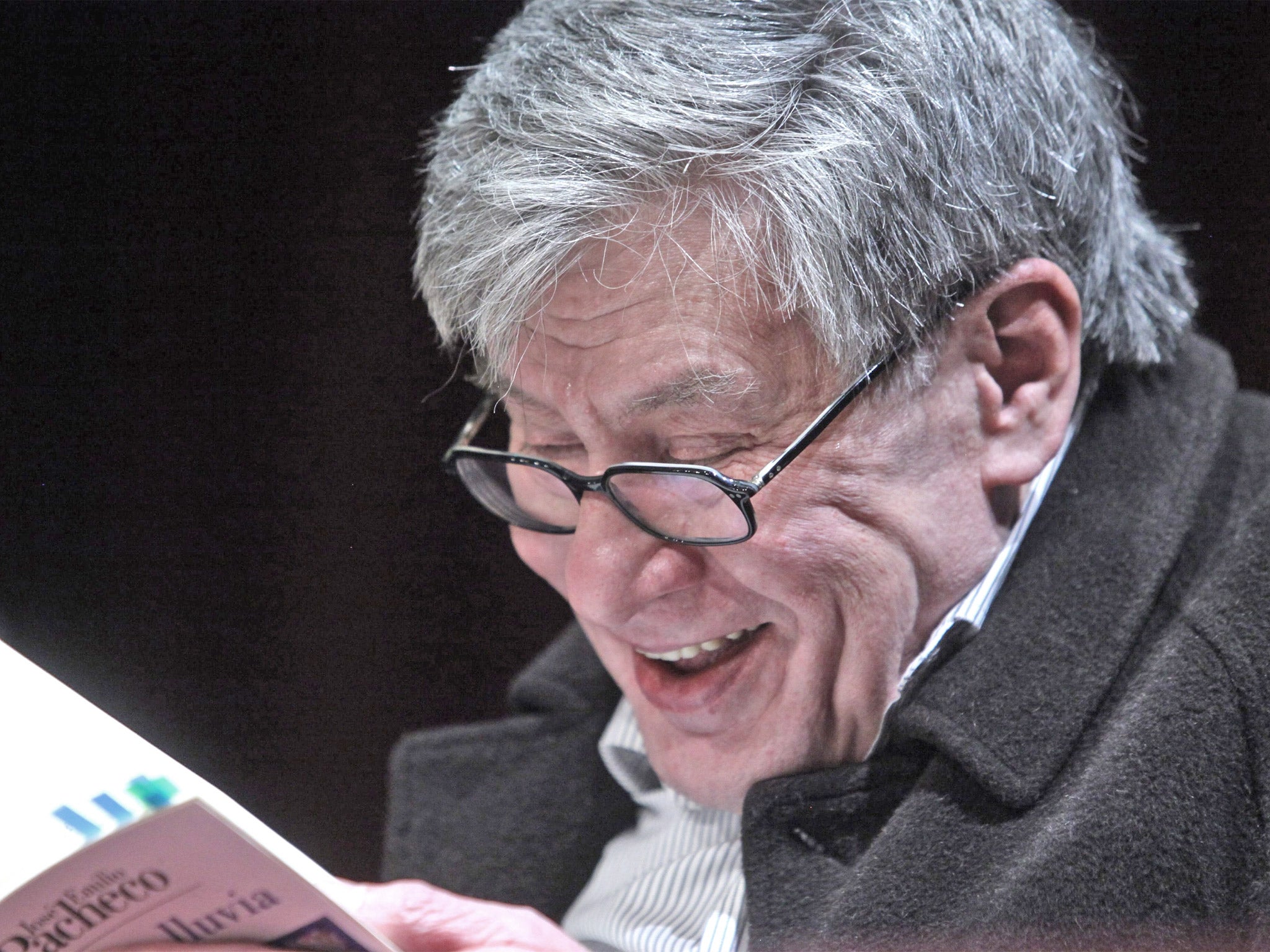Jose Emilio Pacheco: Poet, essayist and novelist who won the Cervantes Prize and was regarded as one of the finest writers in Spanish

Jose Emilio Pacheco was considered one of the finest writers in the Spanish language, winning the Cervantes Prize for Literature in 2009, the highest award for writers in what is the native language of more than 300 million people. The award from the Spanish Ministry of Culture was presented at the University of Alcala by Spain's King Juan Carlos. In his later years Pacheco became visiting Professor of Literature at the University of Essex.
He was best-known as a poet, and was widely regarded as the most important Mexican poet of the latter half of the 20th century, but he was also a journalist, essayist, literary critic and author of some 30 works including novels and short stories. In addition, he translated more than 20 works by English-language writers including Oscar Wilde, Hans Christian Andersen, Samuel Beckett, Lewis Carroll, Tennessee Williams, TS Eliot and Harold Pinter. His own works, mostly his collections of poems, were translated into English, French, German, Russian and Japanese.
Pacheco was one of a group of angry young Mexican poets, writers and journalists who came to prominence during the heady 1960s, addressing issues such as poverty and corruption in what was then effectively a one-party system, as well as raising new concerns over pollution and other ecological threats. Strongly influenced by the so-called Tlatelolco Massacre of October 1968, when scores of students and others, protesting against the cost of the forthcoming Olympic Games, were shot dead by rooftop snipers, they included Pacheco's fellow Mexican Elena Poniatowska, who received the Cervantes Prize last November.
The backdrop of Mexico City was behind much of Pacheco's work; he watched it become one of the world's most populated and polluted cities and saw millionaires became billionaires while the majority, notably the indigenous Indian population, went hungry and begged in the streets. His 15 books of poetry were recently turned into an anthology, Tarde o Temprano [Sooner or Later] Poemas 1958-2009.
In his earlier work, in the late 1950s, he leaned towards surrealism, but eventually took a simpler, more direct approach which added yet more power to his heart-rending accounts of poor children growing up in the slums of their metropolis. His poem "Alta Traición" (High Treason) became a reference point for many Mexicans in dealing with the contradictions of their part-Indian, part-colonial nation, once described as "Poor Mexico, so far from God, so close to the United States."
Although poetry was his first love, one of his most famous novellas was Las Batallas en el Desierto (The Battles in the Desert, 1981), which told the tale of a schoolboy infatuated by the mother of one of his classmates. Like much of his work it deals with the passing of time and the transitory nature of the human experience. It opens with the narrator, Carlos, saying, "I remember, I don't remember ... I am going to keep my memory of this moment intact because everything that now exists will never be the same again." The book was adapted for the stage and for a film entitled Mariana, Mariana, directed by Alberto Isaac, and was turned into a pop song and video, "Las Batallas", by the Mexico City rock band Café Tacvba in 1992.
He was born in Mexico City in 1939, the son of a general in Mexico's 1910-17 revolutionary army who became a lawyer, and a mother from a wealthy family in the port of Veracruz. His education was complemented by his grandparents, who taught him to read and fascinated him with legends from Mexico's pre-Columbian Aztec past. He set out studying law to join his father's firm but soon switched to philosophy and letters at the sprawling National Autonomous University of Mexico. He first tinkered with plays, then poetry and later short stories and novels, and went on to become editor of Culture, one of the most important literary publications in Mexico during the 1960s.
As the accolades multiplied, Pacheco remained self-effacing – "I'd rather be read than celebrated," he once said. Receiving the Cervantes Prize from King Juan Carlos, he said: "I'm not the best poet in Mexico, not even in my barrio. You realise Juan Gelman is my neighbour?" He was referring to the Argentinian writer who lived near him in Mexico City and died there this month (obituary, 16 January). Two days before Pacheco died he wrote an appreciation of Gelman in his column for the influential Mexican magazine El Proceso.
"It's the poetry that matters, not the poets, nor the literary circus," Pacheco once said. "In poetry, what's not excellent is worthless ... the language in which I was born is my only wealth." At the Cervantes Prize ceremony he inadvertently broke the solemnity of the formal occasion when the trousers of his white-tie-and-tails suit slipped down to his knees on his way into the hall and he had to hold them up with one hand, the other leaning on a walking stick. "I'd never dressed as a penguin before," he said later. "I didn't realise I should have worn braces."
Pacheco died in hospital of cardiac arrest, two days after he fell in his study and hit his head on his desk. He is survived by his wife Cristina, a well-known TV journalist on cultural themes, and two daughters.
PHIL DAVISON
Jose Emilio Pacheco Berny, poet, essayist and author: born Mexico City 30 June 1939; married Cristina Romo Hernandez (two daughters); died Mexico City 26 January 2014.
Join our commenting forum
Join thought-provoking conversations, follow other Independent readers and see their replies
Comments
Bookmark popover
Removed from bookmarks